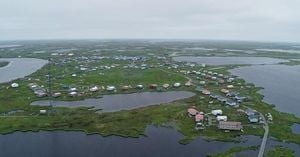The horizon over Florida's Space Coast is set to become even more vibrant as multiple rocket launches are scheduled for this coming December. With ambitions reaching new heights, both government agencies and private companies are ready to take to the skies, showcasing the latest advancements in space technology and exploration.
Among the highlights is the long-awaited launch of the Sentinel 1C satellite, part of the European Space Agency's Copernicus program. This mission aims to bolster Europe's capabilities to monitor the Earth's environmental changes, tracking everything from agricultural activity to deforestation. The satellite will join its twin, Sentinel 1B, which has been operational since 2016. According to experts, Sentinel 1C is expected to significantly improve the frequency and quality of radar imagery available across Europe and beyond.
Scheduled for takeoff shortly after, the PROBA 3 mission is poised to demonstrate new technologies for space-based observation. Managed by the European Space Agency, the mission involves two satellites working together to perform formation flying, which will allow for high-precision measurements of solar phenomena, including solar flares and their impact on Earth's atmosphere. This innovative approach marks another step forward in how we gather and analyze data from outer space.
American aerospace giant SpaceX is also playing its part, with several launches on the docket. One of the most eagerly awaited events is the Falcon 9 mission carrying PayloadX, which aims to deploy dozens of satellites intended to improve global internet coverage and connectivity. SpaceX has revolutionized the space industry not only with its commercial launches but also by dramatically cutting down costs and improving the turnaround time for rocket reusability.
Adding to the excitement, NASA will be hosting the launch of its long-awaited Europa Clipper mission. This mission aims to explore Europa, one of Jupiter's moons, which is believed to have a subsurface ocean capable of supporting life. The Europa Clipper will conduct reconnaissance of Europa's ice shell and subsurface ocean, leading to insights about the moon's habitability. Scientists speculate this mission could be monumental for astrobiology and the search for extraterrestrial life.
Meanwhile, competitors are also gearing up for their airtime. Blue Origin, founded by Amazon's Jeff Bezos, is set to launch its New Shepard vehicle for suborbital tourism flights. The company aims to make space travel accessible to more people, and with this mission, they will continue testing their systems before fully commercializing space tourism experiences.
Each of these launches is not just about the payloads; they symbolize the unraveling of new possibilities for humanity as we transition to a future reliant on space-based technologies. The rapid innovation and advancements exhibited by both government and private enterprises reflect our society’s growing capabilities and aspirations to explore beyond our planet.
Florida's Space Coast serves as the epicenter for this burgeoning revolution. Home to NASA's Kennedy Space Center and Cape Canaveral Space Force Station, this region has been at the forefront of American space exploration for decades. The state's optimal launch conditions—thanks to favorable weather patterns and proximity to open ocean—make it ideal for launching various missions.
Residents and space enthusiasts are encouraged to flock to viewing points along the coast, where they can witness the launches as they light up the sky. Local businesses also have geared up for the influx of visitors, offering viewing events and themed promotions. The launches not only spark excitement among onlookers but also provide significant boosts to the local economy.
With December bringing this flurry of activity, it’s clear the space race is back on—this time fueled by both governmental and commercial efforts. The world watches closely as these ambitious plans come to fruition, underscoring the collaboration and competition between nations and corporations to push the boundaries of human exploration and knowledge.
Indeed, the upcoming rocket launches from Florida's Space Coast are set to showcase humanity's relentless pursuit of discovery, as we aim to reach for the stars and learn more about the universe around us.



